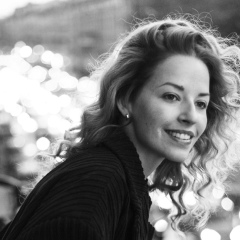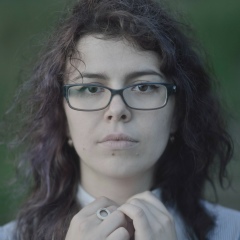"Что ж, сунемся и мы с суконным рылом в калашный ряд. Мне вот тоже мерещится, что всех встреченных мною людей можно распределить по двум полкам. На первой окажутся те, для кого реалии этого мира важны как таковые. На второй же возлягут те, кого более интересуют не столько сами реалии, сколько отношения и связи между ними.
Попробую привести пример. Для первых добро есть добро, зло есть зло – какие ж тут сомнения? А вот вопрос «Почему это добро и зло в определённых ситуациях идут рука об руку и ведут себя совершенно одинаково?» может посетить только человека со второй полки.
«Распалась связь времён...» Вся прелесть в том, что для обитателей первой полки она никогда и не возникала. Каждое явление представляется им как бы само по себе, и поэтому, чтобы сохранить рассудок в годы перемен, её обитатели обычно прибегают к склерозу. Митрополит напрочь забывает о том, что когда-то был замполитом. А пламенному революционеру лучше не напоминать о тех временах, когда он служил в охранке. Картина, впрочем, дьявольски усложняется тем, что любой из нас в процессе беседы так и норовит перебраться с полки на полку...
Так в брежневские времена дедушки моих знакомых поголовно гибли в боях с белогвардейцами, а дяди – защищая Советскую Родину от фашизма. Однако стоило начаться перестройке, как те же самые дедушки оказались расстрелянными ЧК, а дяди сгинули в недрах ГУЛага. И ведь не врут – хоть на детекторе лжи проверяй. Видимо, всё это вместе и называется альтернативной историей. Собственно, история другой и не бывает. Как выразился персонаж того же Достоевского, «вранье всегда простить можно; вранье дело милое, потому что к правде ведет. Нет, то досадно, что врут, да еще собственному вранью поклоняются.»
И, если вдруг некто маститый-простатитый начнёт во всеуслышание стонать, как его угнетала советская цензура, попросите назвать фамилию цензора. Тут же выяснится, что в виду имелся редактор, рецензент, короче говоря, такой же литератор, как и сам пострадавший. И ещё одна закономерность: чем громче стоны, тем больше вероятность, что стенающий и сам был блюстителем идейной чистоты, причём не по долгу службы, а по велению сердца.
Как вымолвил однажды со вздохом видный волгоградский поэт, елейно возведя глаза к потолку бара: "Бог на небесах разберёт, кто на кого стучал…"
Но самому, согласитесь, признаваться как-то неловко. Куда проще свалить все грехи на румяного Сашу с 13-го этажа."
Е. Лукин. Взгляд со второй полки
Вранье, ведущее к правде
Затворите мне темницу
Попробую привести пример. Для первых добро есть добро, зло есть зло – какие ж тут сомнения? А вот вопрос «Почему это добро и зло в определённых ситуациях идут рука об руку и ведут себя совершенно одинаково?» может посетить только человека со второй полки.
«Распалась связь времён...» Вся прелесть в том, что для обитателей первой полки она никогда и не возникала. Каждое явление представляется им как бы само по себе, и поэтому, чтобы сохранить рассудок в годы перемен, её обитатели обычно прибегают к склерозу. Митрополит напрочь забывает о том, что когда-то был замполитом. А пламенному революционеру лучше не напоминать о тех временах, когда он служил в охранке. Картина, впрочем, дьявольски усложняется тем, что любой из нас в процессе беседы так и норовит перебраться с полки на полку...
Так в брежневские времена дедушки моих знакомых поголовно гибли в боях с белогвардейцами, а дяди – защищая Советскую Родину от фашизма. Однако стоило начаться перестройке, как те же самые дедушки оказались расстрелянными ЧК, а дяди сгинули в недрах ГУЛага. И ведь не врут – хоть на детекторе лжи проверяй. Видимо, всё это вместе и называется альтернативной историей. Собственно, история другой и не бывает. Как выразился персонаж того же Достоевского, «вранье всегда простить можно; вранье дело милое, потому что к правде ведет. Нет, то досадно, что врут, да еще собственному вранью поклоняются.»
И, если вдруг некто маститый-простатитый начнёт во всеуслышание стонать, как его угнетала советская цензура, попросите назвать фамилию цензора. Тут же выяснится, что в виду имелся редактор, рецензент, короче говоря, такой же литератор, как и сам пострадавший. И ещё одна закономерность: чем громче стоны, тем больше вероятность, что стенающий и сам был блюстителем идейной чистоты, причём не по долгу службы, а по велению сердца.
Как вымолвил однажды со вздохом видный волгоградский поэт, елейно возведя глаза к потолку бара: "Бог на небесах разберёт, кто на кого стучал…"
Но самому, согласитесь, признаваться как-то неловко. Куда проще свалить все грехи на румяного Сашу с 13-го этажа."
Е. Лукин. Взгляд со второй полки
Вранье, ведущее к правде
Затворите мне темницу
“Well, let's stick with the cloth snout in a Kalash line. It also seems to me that all the people I met can be divided into two regiments. The first will show those for whom the realities of this world are important as such. The second who are more interested not so much in the realities themselves as in the relationships and relationships between them.
I will try to give an example. For the former, good is good, evil is evil - what are the doubts? But the question "Why is this good and evil in certain situations go hand in hand and behave exactly the same?" can only visit a person from the second shelf.
“The connection of the times has broken ...” The whole charm is that for the inhabitants of the first shelf it never arose. Each phenomenon appears to them as if by itself, and therefore, in order to maintain reason in the years of change, its inhabitants usually resort to sclerosis. The metropolitan completely forgets that he was once a political officer. A fiery revolutionary is better not to be reminded of the times when he served in the secret police. The picture, however, is devilishly complicated by the fact that each of us in the process of conversation strives to move from shelf to shelf ...
So in Brezhnev’s times, the grandfathers of my friends died in battle with the White Guards, and my uncles defended the Soviet Homeland from fascism. However, as perestroika began, the very same grandfathers were shot by the Cheka, and uncles perished in the bowels of the Gulag. And they don’t lie - at least check on a lie detector. Apparently, all this together is called an alternative story. Actually, the story is different. As the character of the same Dostoevsky put it, “lies can always be forgiven; lies are a sweet deed, because they lead to truth. No, it’s annoying that they lie, and they even worship their own lies. ”
And, if suddenly a venerable prostate begins to groan publicly, as Soviet censorship oppressed him, ask him to give the name of the censor. It immediately becomes clear that he was referring to the editor, reviewer, in short, the same writer as the victim himself. And one more regularity: the louder the groans, the greater the likelihood that the moaning himself was the guardian of ideological purity, and not by duty, but by the command of the heart.
As a prominent Volgograd poet once said with a sigh, raising his eyes faintly to the ceiling of the bar: "God in heaven will figure out who knocked whom ..."
But you yourself, you must admit, admit it is somehow awkward. "It’s much easier to blame all sins on the ruddy Sasha from the 13th floor."
E. Lukin. A look from the second shelf
Lies leading to the truth
Shut me the dungeon
I will try to give an example. For the former, good is good, evil is evil - what are the doubts? But the question "Why is this good and evil in certain situations go hand in hand and behave exactly the same?" can only visit a person from the second shelf.
“The connection of the times has broken ...” The whole charm is that for the inhabitants of the first shelf it never arose. Each phenomenon appears to them as if by itself, and therefore, in order to maintain reason in the years of change, its inhabitants usually resort to sclerosis. The metropolitan completely forgets that he was once a political officer. A fiery revolutionary is better not to be reminded of the times when he served in the secret police. The picture, however, is devilishly complicated by the fact that each of us in the process of conversation strives to move from shelf to shelf ...
So in Brezhnev’s times, the grandfathers of my friends died in battle with the White Guards, and my uncles defended the Soviet Homeland from fascism. However, as perestroika began, the very same grandfathers were shot by the Cheka, and uncles perished in the bowels of the Gulag. And they don’t lie - at least check on a lie detector. Apparently, all this together is called an alternative story. Actually, the story is different. As the character of the same Dostoevsky put it, “lies can always be forgiven; lies are a sweet deed, because they lead to truth. No, it’s annoying that they lie, and they even worship their own lies. ”
And, if suddenly a venerable prostate begins to groan publicly, as Soviet censorship oppressed him, ask him to give the name of the censor. It immediately becomes clear that he was referring to the editor, reviewer, in short, the same writer as the victim himself. And one more regularity: the louder the groans, the greater the likelihood that the moaning himself was the guardian of ideological purity, and not by duty, but by the command of the heart.
As a prominent Volgograd poet once said with a sigh, raising his eyes faintly to the ceiling of the bar: "God in heaven will figure out who knocked whom ..."
But you yourself, you must admit, admit it is somehow awkward. "It’s much easier to blame all sins on the ruddy Sasha from the 13th floor."
E. Lukin. A look from the second shelf
Lies leading to the truth
Shut me the dungeon


У записи 2 лайков,
0 репостов,
354 просмотров.
0 репостов,
354 просмотров.
Эту запись оставил(а) на своей стене Siberian Barber






















